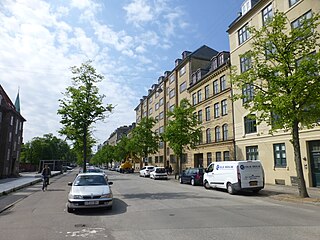Kjøbenhavns Boldklub or KB is a Danish sports club based in Copenhagen. The club was founded 26 April 1876 on the grassy fields in outer Copenhagen which later became Fælledparken. Tennis has been played since 1883. The club hosted, in 1921, one of the early tennis majors: the World Covered Court Championships, won by William Laurentz that year. Today, along with the sports already mentioned, the club also has facilities for badminton, swimming and pétanque.

Denmark competed at the 1980 Summer Olympics in Moscow, USSR. In partial support of the American-led boycott of the 1980 Summer Olympics, Denmark competed under the Olympic Flag instead of its national flag. 58 competitors, 55 men and 3 women, took part in 30 events in 13 sports.

Denmark competed at the 1952 Summer Olympics in Helsinki, Finland. 129 competitors, 115 men and 14 women, took part in 73 events in 15 sports.

Poul David Reichhardt was a Danish actor, well known for his roles in Danish 1940s/1950s comedies. Later on, he also played more serious and varied roles; he has also starred in Huset på Christianshavn, Matador and as various minor characters in the Olsen-banden films.

Ivar Bentsen was a Danish architect and educator. He was a central figure in the Bedre-Byggeskik movement and succeeded Carl Petersen as a professor at the Royal Danish Academy of Fine Arts's School of Architecture in 1923. He was awarded the C. F. Hansen Medal in 1943.

Lau Lauritzen Jr., was a Danish actor, screenwriter, and film director. As a director, he was a 4-time recipient of the Bodil Award for Best Danish Film. Lauritzen co-founded the Danish film studio ASA Film and served as the studio's artistic director (1937–1945) and administrative director (1945–1964).
Events in the year 1863 in Norway.

Blegdamsvej is a street in Copenhagen, Denmark, connecting Sankt Hans Torv in Nørrebro to Trianglen in Østerbro. The busy artery Fredensgade separates the Nørrebro and Østerbro sections of the street from each other. The north side of the street is dominated by the Panum Building and Rigshospitalet, located on either side of Tagensvej.

Nørre Alle is a street in Copenhagen, Denmark, running from Blegdamsvej in Nørrebro in the south to Vibenshus Runddel in Østerbro in the north. It runs through University of Copenhagen's North Campus which is centred on its junction with Tagensvej. The section north of the junction, which separates Fælledparken to the east from the University Park to the west, is a busy artery. De Gamles By is situated on the west side of the more quiet, western portion.

Møllegade is a street in the Nørrebro district of Copenhagen, Denmark. It runs from Nørrebrogade in the southwest to Nørre Allé in the northeast. Copenhagen's Jewish Northern Cemetery has its entrance on the south side of the street and De Gamles By is located on its north side.
Harald Magnus Lønborg-Jensen was a Danish architect known as a productive church and restoration-architect.

The 1926 KBUs Pokalturnering was the 17th edition of the regional tournament, KBUs Pokalturnering, the highest senior cup competition organised by the Copenhagen FA (KBU). The tournament was held in the fall of 1926 with BK Frem, then based on Enghavevej, as the defending cup champions. The season was launched with one match on 22 August 1926 between the last season's runners-up in Copenhagen Football League B.93 and the newly promoted league club BK Fremad Amager. This season's installment was won by B.93 after defeating Kjøbenhavns BK 5–1 in the final played at Københavns Idrætspark on 7 November 1926, which was the club's fifth cup title after having contested in eight finals of the tournament. The 8 participants in the tournament included the six members of the 1925–26 KBUs Mesterskabsrække and the two highest placed teams from the 1925–26 KBUs A-række.
Vesterfælledvej is a street in the Vesterbro district of Copenhagen, Denmark. The street runs from Vesterbrogade at Sorte Hest in the north to Vigerslev Allé in the south. The Carlsberg and Humleby neighbourhoods are located on the west side of the street.

Laksegade 26 is a Neoclassical property situated at the corner of Laksegade and Nikolajgade in central Copenhagen, Denmark. It was listed in the Danish registry of protected buildings and places in 1939. A plaque on the facade towards Laksegade commemorates that the architect Theophilus Hansen was born in the building.











